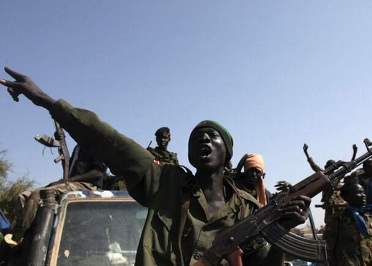S. Sudan army commander warns against counter-offensive
July 23, 2014 (JUBA) – South Sudanese army commander has warned against launching a major offensive targeting the positions of rebel fighters allied to former vice-president Riek Machar amid repeated violations to a ceasefire agreement signed by both warring parties.

There is a growing perception that retaking particular towns or areas would result in only short-term gains for the government and would not bring an end to the ongoing rebellion.
The public address was the first since the former Northern Bahr el Ghazal state governor’s new military appointment. It also comes amid a fresh outbreak of violence between government troops and rebels in Upper Nile state’s Nasir and Jonglei state’s Ayod in recent days.
However, Awan cautioned against interpreting the restraint of the government army as a sign of weakness.
“Let nobody think we are not capable of taking back all these areas,” Awan told reporters.
Awan further explained that attacks by government troops on the rebel positions before the 9 May agreement between president Salva Kiir and Machar were deliberately “calculated” to gain ground prior to the signing of a deal, which recommitted the government to an earlier cessation of hostilities agreement.
Prior to the May deal, he said troops from the South Sudanese army (SPLA) had been advancing on several fronts, even reaching strategic Upper Nile town Nasir, before pulling back after president Salva Kiir instructed military forces to honour the terms of the agreement.
“We were advancing in all fronts, but on the way we got instructions from [the] commander-in-chief (Kiir) that they have signed [a] cessation of hostilities [agreement] in Addis Ababa, and immediately we put our operation off where we were,” he added.
Government troops and pro-Machar forces have been engaged in bloody fighting since conflict erupted in mid-December last year amid escalating political tensions within the ruling SPLM party.
The renewed 9 May ceasefire agreement followed a meeting between president Salva Kiir and Machar in the Ethiopian capital, Addis Ababa – their first since the conflict erupted.
At the time, Awan said the SPLA had been moving from Gadiang toward Ayod and Poktap, as well as advancing from Malakal to Baliet, Ulang and Nasir, where they were preparing to take areas beyond.
“They (rebels) did not stop us. We wanted to take all the areas beyond Nasir, said Awan, adding the army had also been making significant gains on other fronts from Guel Guk towards Mangok, Mathiang, Maiwut and Pagak.
Awan’s remarks have drawn mixed reactions, with claims the statements confirm that government troops had deliberately accelerated military operations in the Upper Nile region in days leading up to the renewed 9 May agreement following a meeting.
Critics claim the apparent show of military strength ahead of the meeting represents a clear violation of a cessation of hostilities agreement signed by both sides.
The agreement signed on 23 January, just over one month after the crisis erupted, failed to halt fighting on the ground, with the rival leaders subsequently meeting in Addis Ababa to personally recommit themselves to observing the truce at the urging of members states of the Intergovernmental Authority on Development (IGAD), the East African bloc mediating peace negotiations
The latest outbreak of violence in South Sudan has sparked international condemnation, with UN secretary-general Ban Ki-Moon urging Machar to immediately cease all offensive operations in Nasir and other areas.
(ST)
